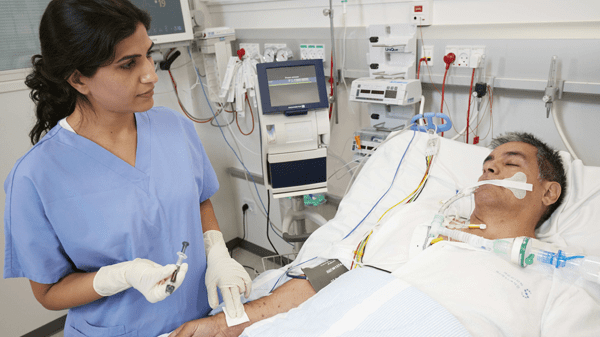Get 19 critical parameters on one tiny blood sample
The ABL90 FLEX PLUS delivers lab-quality results at the point of care for more confident treatment decisions. Continuous automatic quality management (AQM) provides automatic quality control, continuous checks and automatically initiates and documents corrective actions.
The ABL90 FLEX PLUS delivers test results in just 35 seconds on up to 19 vital parameters, including creatinine and urea - all from one blood sample of only 65 µL*. With a high uptime of more than 23.5 hours per day and only 60 seconds between each sample measurement, the analyzer is quickly ready for you to test the next sample.
This extended panel of critical parameters within blood gas testing gives you more clinical insight here and now, allowing you to act on results and make life-saving diagnostic decisions.
Parameters measured
Blood gases: pH, pCO2, pO2
Metabolites: cGlu, cLac, cCrea, cUrea
Electrolytes: cCa2+, cCl-, cK+, cNa+
Oximetry: FCOHb, ctBil, ctHb, FHbF, FHHb, FMetHb, sO2, FO2Hb
Your blood gas analyzer with an expanded test menu
With the new addition of creatinine and urea to the blood gas testing menu, the ABL90 FLEX PLUS blood gas analyzer offers a broader range of critical care parameters on a compact platform.
Creatinine and urea results at the point of care can give you fast insight into the kidney status of your critically ill patient.
Watch the video and see how the ABL90 FLEX PLUS blood gas analyzer sets new standards for time to results, ease of use, parameter panel and reliability.
The ABL90 FLEX PLUS blood gas analyzer with Crea and Urea
Video Credit: Radiometer
Improve patient flow in the ED with more STAT parameters
Fast test results are crucial to overcome the challenge of overcrowding in the emergency department (ED).
Creatinine results at the point of care allow you to identify patients at risk of acute kidney injury (AKI) as well as to quickly assess your patient's kidney status before CT or MRI scans to determine if there’s a risk of contrast-induced nephropathy [1-3].
Also, creatinine and urea results can help you assess dehydration as well as identify the origin of gastrointestinal bleeding [1,2].
With creatinine and urea as STAT parameters, you can make your diagnostic decisions faster during triage and improve patient flow in the ED – two significant improvements in processes.

Image Credit: Radiometer
Optimizing workflows in the ICU: no more waiting for results from the lab
In the ICU, getting the necessary results quicker will enable you to make more informed decisions about the treatment of your patient.
In the ICU, creatinine and urea results can:
- help you monitor the kidney function of your patient [2]
- assist in predicting heart failure [2]
- assist in monitoring the effectiveness of hemodialysis and in assessing the severity of pancreatitis [2]
- indicate early chronic kidney disease (CKD) which will allow you to initiate appropriate and timely treatment [2].

Image Credit: Radiometer
References
- https://acutecaretesting.org/en/articles/urea-and-the-clinical-value-of-measuring-blood-urea-concentration
- https://acutecaretesting.org/en/articles/urea-and-creatinine-concentration-the-urea-creatinine-ratio
- Acute care testing handbook. Radiometer Medical ApS, 2700 Brønshøj, Denmark, 2014. As accessed on http://www.radiometer.com/en/knowledge-center/handbooks/acute-care-testing-handbook.